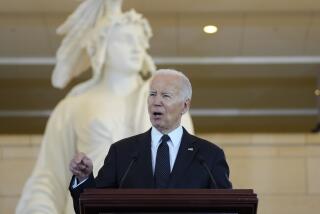Focus of NEA Debate Shifts to Language
- Share via
An influential congressman said Wednesday he will propose legislation to bar support by the National Endowment for the Arts of creative work that may “deliberately denigrate” the American cultural heritage, defile “religious traditions” or could be construed as obscene or indecent.
The disclosure by Rep. Paul Henry (R-Mich.) came as intense negotiations continued among various players in the NEA political crisis--and as the focus of the debate shifted to finding regulatory language acceptable to the White House and Congress.
Washington observers said Henry’s proposed wording (see box on Page 12) appeared to impose greater restrictions on content than a proposal unsuccessfully advanced last year by Sen. Jesse Helms (R-N.C.), but it was clear that both the White House and many congressmen believe content restrictions may be inevitable.
In a telephone interview Wednesday afternoon, Henry said he was unsure if he would formally introduce the amendment at a House committee meeting next week (chaired by Democratic Rep. Augustus Hawkins of Los Angeles), or wait until a bill to reauthorize the NEA comes up for a full House vote. (House Speaker Tom Foley (D-Mass.) said Wednesday that floor action on the NEA bill will be scheduled for mid-July.)
Henry’s amendment was produced after meetings at his office Tuesday attended by NEA Chairman John E. Frohnmayer and top White House officials including William Kristol, chief of staff to Vice President Dan Quayle.
Before this week, President Bush had adamantly opposed any form of censorship in the NEA legislation, but on Monday, the Administration appeared to waver on the issue, with a Bush spokesman indicating that the Administration could favor statutory prohibition of NEA support for obscene or blasphemous work.
A senior Administration official, who requested anonymity, acknowledged the situation was in flux and that the White House had essentially abandoned an earlier position favoring reauthorization without any restrictions on art content.
“We’ve moved. We’re now willing to accept some standards language, some restrictions,” the official said.
“We’re going to let the legislative process run. There are some reasonable House Republicans. We’re hoping they come up with something . . . but we’re no longer trying to shove ‘no language’ down people’s throats.”
The official identified those “reasonable House Republicans” as Henry and Reps. Tom Coleman (R-Mo.) and Steve Gunderson (R-Wis.). Coleman and Gunderson are the authors of yet another controversial NEA legislative alternative. Their plan would completely restructure public funding of the arts in the United States by tripling--to 60%--the proportion of the NEA budget that goes directly to state arts councils in the form of block grants.
“I’m not claiming perfection on this,” Henry said of his proposed amendment. “It addresses the concerns (that) the public and members of Congress have with the issue and I have a hard time understanding why anyone would not want to accept this language.”
The Henry wording was immediately attacked by key Democrats. “It’s a good try that demonstrates how difficult it is to write subject restriction language without creating mischief,” said Rep. Pat Williams (D-Mont.), chairman of the House NEA reauthorization subcommittee.
“The Henry language would result in mischievousness--unintended, but real--at the NEA,” Williams said. “Overall, the language attempts to be benign, but there’s no such thing as neutral censorship.”
An NEA spokeswoman said, “We have no comment at this time on deliberations that are going on, about length of time (of the NEA renewal) or of any content restrictions.”
The continuing political imbroglio had caused Frohnmayer to cancel two scheduled appearances in San Diego this weekend, where he was to have addressed an artists’ town meeting Saturday and a convention of the National Assembly of Local Arts Agencies on Sunday.
It was learned that other discussions involving the White House and the NEA have apparently focused on proposals to create a legal mechanism under which the NEA would be precluded from supporting obscene work, but with interpretation of obscene left to the discretion of local courts.
Under this plan, according to various sources, the NEA would be empowered to take back money from an artist whose work was judged obscene, or declare the artist ineligible for applying for any more NEA grants--for as much as six years.
In a telephone interview, Henry said the Tuesday afternoon meeting produced an agreement that Frohnmayer would publicly affirm that there is a qualitative difference between censorship and legislative parameters for public sponsorship of art--an issue that has been at the center of Republican objections to a variety of NEA grants supporting controversial work.
Language of New NEA Proposal
Following is the proposed new language to House of Representatives legislation on NEA reauthorization.
“The Chairman and the National Council for the Arts shall insure (sic) that any award, grant, loan, or other form of support provided under this Act demonstrates a commitment to artistic excellence which is sensitive to the nature of public sponsorship, and does not deliberately denigrate the cultural heritage of the United States, its religious traditions, or racial or ethnic groups. The Chairman and the National Council for the Arts shall insure (sic) that any award, grant, loan, or other form of support provided under this Act does not violate prevailing standards of obscenity or indecency.”
More to Read
The biggest entertainment stories
Get our big stories about Hollywood, film, television, music, arts, culture and more right in your inbox as soon as they publish.
You may occasionally receive promotional content from the Los Angeles Times.










